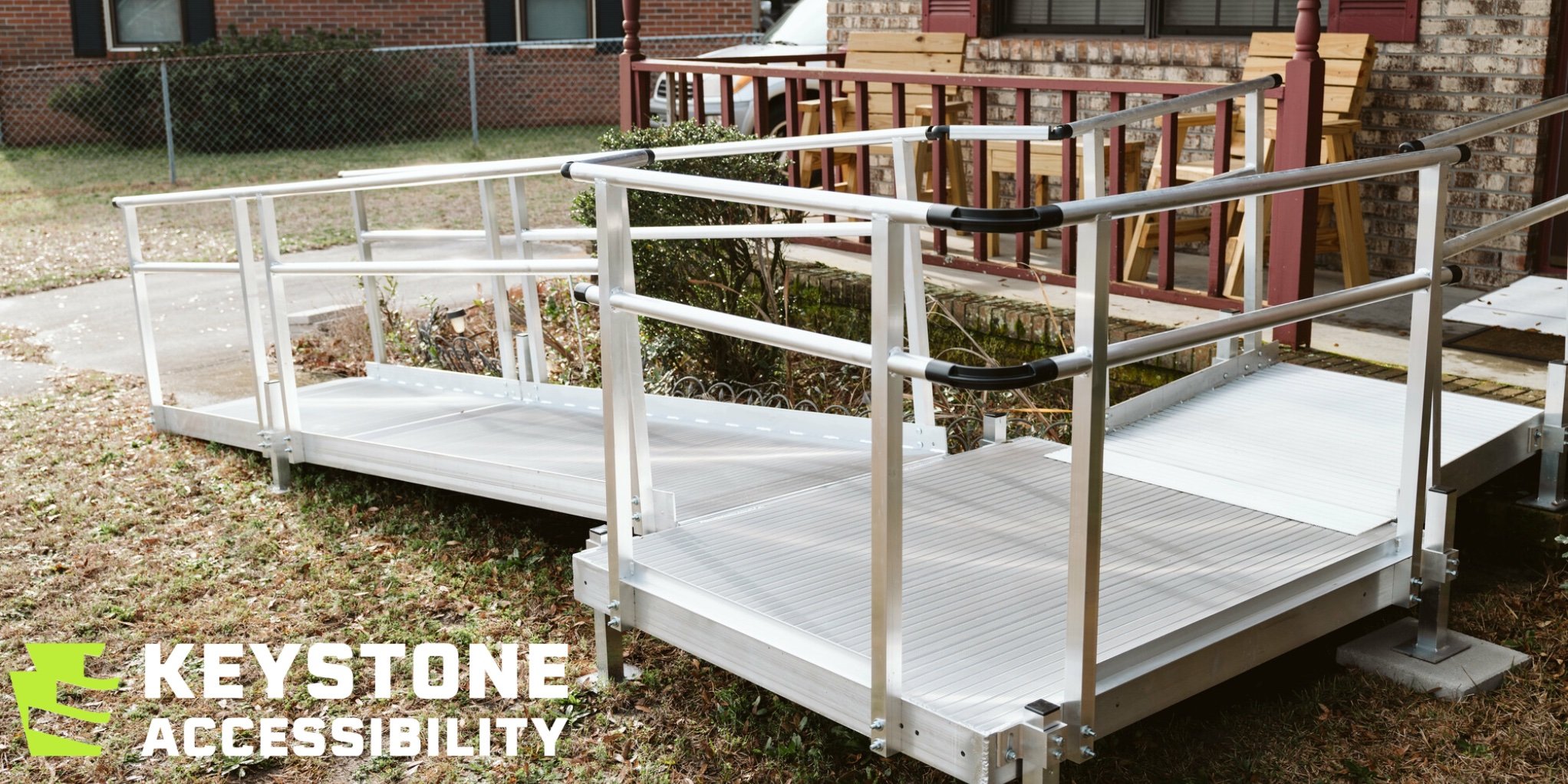Modular Wheelchair Ramps
At Keystone Accessibility, we understand that every home is unique, just like the people who live there. Our goal is to make your space accessible, comfortable, and most importantly, a safe place for everyone. Our modular ramps are designed with you in mind, offering customizable solutions that suit your home’s specific layout. Whether you're looking to make entering your home easier for yourself, a family member, or a visitor using a mobility device, we’re here to help you every step of the way.
Why Choose a Modular Ramp?
Modular ramps are a great choice if you want a safe, long-lasting ramp that’s customizable for your home or property. Our modular elevation ramps are built with durable aluminum, equipped with sturdy J-hook connections, and feature tongue-and-groove assembly for ultimate stability. You can rest easy knowing our ramps are ADA-compliant and come with a non-slip surface that performs excellently in wet conditions. Plus, our modular ramps are easily disassembled and transported, making them a versatile solution if you need to move.
Key Features of Elevation Modular Ramps
Professional Installation Included: At Keystone Accessibility, we offer professional installation for every modular ramp to ensure it's set up properly and safely.
Easy Access for Mobility Devices: Our ramps provide convenient access for individuals using wheelchairs, walkers, or scooters, making your home accessible and user-friendly.
Portable and Storable: Ramp sections are designed to be easily disassembled and stored when not in use, adding flexibility for temporary or changing needs.
Non-Slip Surface for Safety: Equipped with a non-slip surface, the ramp ensures secure footing, even in wet conditions, providing maximum traction for safe use.
Heavy-Duty Design: Harmar modular ramps are engineered to support heavy loads of up to 850 lbs, offering robust and reliable accessibility for all users.
ADA Compliant: Suitable for both residential and commercial applications.
What to Know About ADA Requirements
Slope and Platform Requirements: According to ADA requirements, a modular ramp should have 12 inches of length for every 1 inch of rise to ensure a safe incline. This gentle slope reduces strain on users and caregivers.
Platforms: An ADA-compliant ramp must have flat landings at both the top and bottom of each ramp run. Platforms are especially crucial when a ramp changes direction. For manual mobility devices, a 4' x 4' platform is recommended, while powered equipment may require a 5' x 5' platform for safe maneuvering.
Safety and Proper Maintenance
Ensuring the longevity and safety of your modular ramp is as easy as a few simple maintenance steps. Keep the ramp surface clear of dirt, leaves, and snow to maintain traction. Avoid using harsh chemicals that could damage the aluminum structure—stick with mild soap and water for cleaning. Snow can be shoveled off, but for ice buildup, we recommend using Magnesium Chloride flakes to melt it away. Regular inspections to tighten loose fasteners can help ensure the ramp stays as safe as possible.
How to Calculate Wheelchair Ramp Length
When planning for a modular ramp, it’s crucial to consider the slope to ensure safe and comfortable use. The standard slope for public facilities is 1:12, meaning for every inch of rise, you’ll need a foot of ramp. For home use, you may choose a slightly steeper incline, but we recommend sticking to a 2:12 ratio for safety. If you’re unsure, our team at Keystone Accessibility is always here to help you figure out the right size and slope for your needs.
FAQs About Modular Ramps
How Wide Should a Wheelchair Ramp Be?
For most residential applications, a wheelchair ramp should be at least 36 inches wide to accommodate standard wheelchairs and scooters comfortably. For commercial purposes, the width may need to be greater to comply with ADA guidelines.
How Steep Can a Wheelchair Ramp Be?
The recommended maximum slope for a wheelchair ramp in commercial or public settings is 1:12, which means one foot of ramp for every inch of elevation. For home use, a 2:12 ratio is recommended to ensure safety without taking up too much space. We do not recommend anything steeper.
Are Resting Platforms Required for Commercial Ramps?
Yes, according to ADA guidelines, resting platforms are required for ramps that rise more than 30 feet in a single run. These platforms provide a safe space for rest and turning.
How Much Do Wheelchair Ramps Cost?
The cost of a modular ramp depends on the length, size, and custom features. Our team can provide a detailed quote based on your specific requirements. Feel free to contact us for a consultation—we’ll help you find the best option to suit your needs and budget.
Where to Buy Wheelchair Ramps?
You can purchase wheelchair ramps directly from Keystone Accessibility. We provide personalized consultations to help you select the right ramp solution, and our experienced team is always ready to assist you.
Ready to Make Your Home More Accessible?
Get in touch today to discuss your modular ramp needs, or to schedule a free consultation. We’re here to make accessibility as easy as possible for you and your loved ones.




